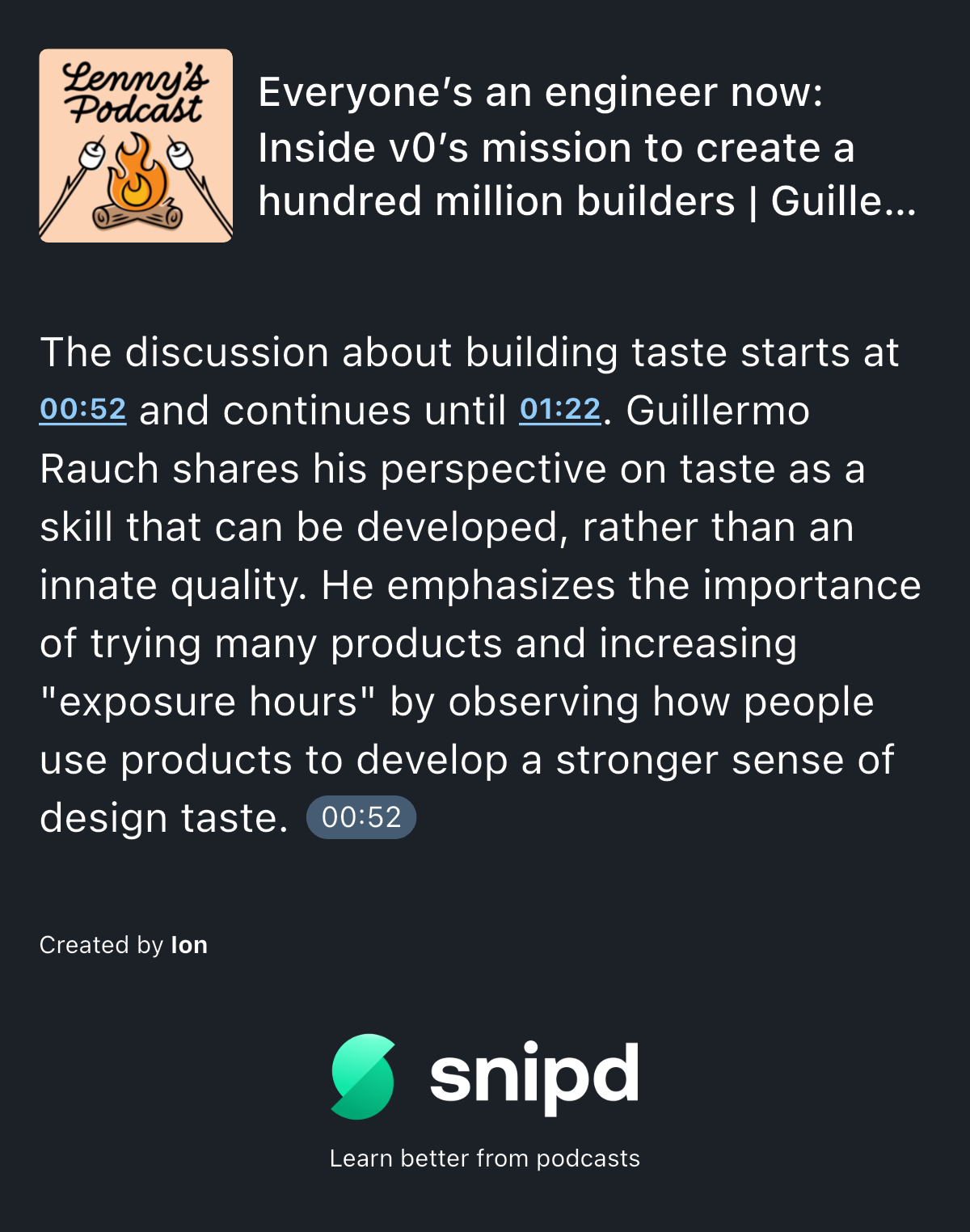Issue 64 |💡The Rise of the Taste Economy: How Judgment Becomes The Ultimate Currency in an AI-Abundant World
In a world where AI makes intelligence cheap, your filter becomes priceless.
IoNTELLIGENCE helps high performers thrive in a fast-changing world by optimizing their minds and leveraging AI.
Upgrade Your Brain. Master AI. Be Future-Ready.
🧠 Time Investment: 5 Minutes.
In a world where AI makes intelligence abundant, what becomes valuable?
Until recently, we revered expertise and paid a premium for it. Then came ChatGPT, Claude, and their ever-smarter siblings. Now, blog posts, pitch decks, and even entire business plans can be generated in seconds. Knowledge itself has become cheap, and Ph.D.-level AI is as accessible as WiFi.
We’ve seen this pattern before.
During the Information Age, smartphones put Wikipedia in our pockets. The result? News lost its value, and attention—our ability to consume and absorb—became the scarce commodity.
Today, we’re entering a new era: the Intelligence Age, where AI is doing to knowledge what Gutenberg and Google did to information.
So here’s the real question:
What becomes scarce when intelligence is abundant?
My answer: Taste.
Not what you expected? Let me explain.
Photo by Tima Miroshnichenko
🚨 The Big Idea
In 1971, Nobel Prize-winning economist Herbert Simon anticipated the dark side of the digital economy decades before it became a reality. In a short phrase, exceptional for its pithiness as much as its prescience, he observed:
"A wealth of information creates a poverty of attention."
In other words, there is always a trade-off between resources that are in a dynamic relationship with each other. Simon's insight also revealed a powerful economic truth:
When abundance floods the system, value flows to the bottleneck.
In a world overflowing with content and distractions, the new scarce resource became our willingness to pay attention. The oversupply of information immediately conferred value to our cognitive capacity—the sensory and mental chokepoint. Attention, not information, became the constraint for companies vying to sell us goods and services. That's why they're willing to pay premium prices—to influencers, for example, or to buy ads during the Super Bowl—to capture our eyes and ears.
I call this the Constraint Premium. During what we might call the Attention Age—roughly from the introduction of the iPhone in 2007 to the present—curation has become a viable and valuable business model. In a world of exploding information, we needed trusted guides to focus our minds. Content was cheap, so audience capture became the primary concern.
We're seeing the same dynamic again, but with significant differences. I argue that since the launch of ChatGPT in late 2022, we have entered a new stage: the Intelligence Age.
In this era, cognition itself is increasingly low-cost and consequently of low value. We can now access encyclopedic intelligence and reasoning (not just information, as with the Internet) in a few seconds for a few cents. When a CEO can generate a comprehensive market analysis in minutes or a student can produce a term paper with a single prompt, we've fundamentally altered the value equation of intellectual work.
So, in this new economy, what is the scarce resource that commands a premium?
I argue it's taste.
When AI can generate limitless options, taste determines which ones matter.
What Is Taste?
At a glance, taste looks like simple preference. You like rap, I like EDM. I prefer nonfiction, you love novels.
But taste runs deeper than mere fondness. Taste is judgment married to personal preference. It's the filter through which you decide not only what's worth consuming but also what to prioritize, pursue, and create. It’s not just about being right—it’s about knowing what feels right, what fits your context, values, and vision.
Let’s make it tangible:
Imagine asking AI to draft a challenging email. It gives you three versions.
Your judgment tells you which one makes the strongest case.
Your personal style picks the tone that feels most aligned with the recipient and situation.
That intersection is taste.
This fusion of intelligence and emotion, analysis and preference, sense and sensibility transforms what thinking machines generate into something personally meaningful. Our taste is how we turn AI outputs into human outcomes.
This isn’t abstract. Taste is already becoming a differentiator across professions. Designers, writers, CEOs—all of them are leaning more on taste, because the raw ideas are cheap now. What matters is knowing what to choose.
People in the tech community are beginning to recognize this. Guillermo Rauch, CEO of the coding company Vercel, says that developing taste is a skill, not an inherent quality. On a recent episode of "Lenny's Podcast," he emphasized the importance of observing how people use your products to help you develop a better sense of design.
The New Value Equation
In a world where intelligence is like electricity—something we can access like a utility—our ability to combine judgment and personal preference becomes our most valuable asset. When AI can produce anything, taste helps us decide what's worth creating.
This creates a new economic reality:
In this new economy, taste is to intelligence what attention was to information.
It's the bottleneck. It's the differentiator. It's the Constraint Premium of our time.
We must develop our taste, deploy it strategically, and leverage it to succeed in the Intelligence Age.
Here’s how.
📈 5 Rules for Thriving in the Taste Economy
1. Don't Just Consume. Curate Your Information Diet.
Be deliberate about the ideas, tools, and voices you let shape your thinking. What you consume impacts what you create downstream. This means being selective about your media consumption, the experts you follow, and even the AI tools you use. Your inputs shape your taste; choose wisely.
2. Stand for Something.
While AI can provide endless answers, only an actual human can deliver an opinion backed by lived experience. Cultivate, articulate, and then advocate. When information is limitless and intelligence is costless, conviction becomes priceless. That's how your distinctive taste is forged and communicated.
3. Train Your Judgment.
My definition of taste combines both elements of this decision-making equation. Our style emerges organically, but judgment has to be constructed intentionally.
This means:
Testing your viewpoint against reality
Studying frameworks from multiple disciplines and building a set of diverse mental models
Taste is the culmination of our values, experiences, and education, so we must invest time in deepening and integrating all three.
4. Set "No" as Your New Default.
Like information before it, AI tempts us with infinite scrolls. Taste tells you when to stop. As humans who evolved in a world of scarcity, we often struggle to cope with abundance. This is true for calories and content today, and it will soon be for cognition as well.
Taste emerges as we develop the discipline to say "no" to 99% of things, focusing our limited attention and agency on the 1% that moves us. When AI generates dozens of potential strategies, taste says, "This one aligns with my values and vision."
5. Make Your Taste Visible.
What you amplify reveals a great deal about who you are. Let people see how you choose, not just what you prefer. In some ways, taste is the fingerprint of your identity; it defines how people perceive you and what makes you unique.
Leaders with distinctive tastes attract talent and opportunity because they provide clarity in a world of overwhelming options. When everyone has access to the same AI tools, one's taste becomes a competitive advantage.
An Architecture of AI Principles Emerges
Over the past few weeks, I've explored how thinking has become commoditized and why this has unleashed agency as a crucial component of success. I described agency as one of the five mindset upgrades we need to remain relevant, resilient, and future-ready. I also introduced the concept of putting our brains in "Airplane Mode" to access the productive mental state of Cognitive Solitude.
Today's exploration of the importance of taste joins this emerging architecture for thriving in the Intelligence Age:
Cognitive Solitude creates the space to develop your authentic perspective
Agency gives you the power to act on your distinctive vision
Taste provides the filter to determine what's worth creating and pursuing
Crucially, you can't download taste or copy it from someone else. Taste is meant to be unique, personal, and distinctive. It emerges through intentional expression, but it must be created and cultivated.
Therefore, taste requires silence, stillness, and a space to think. Yes, we need to feed our minds with ideas and models to develop judgment and a personal aesthetic. But we also need to reflect on what resonates with us and why.
In a world buzzing with informational noise and digital distractions, going into Airplane Mode allows us to access and refine the taste that will become our greatest asset in the Intelligence Age.
The future will not belong to those who can effectively prompt AI, but to the people who also have the taste to know what to request.
🏁 Let’s Talk Taste
💬 What’s your take?
Are you building your taste consciously?
Comment below. I read every response and would love to hear how you're developing your taste in this new era.
If you found this post interesting or valuable, forward it to a friend or click the ❤️ button so more people can discover it. Thanks!
IoNTELLIGENCE by Ion Valis. I'm a strategic advisor and performance coach to entrepreneurs and executives. To learn more about my work, please visit my website or connect with me on LinkedIn.





